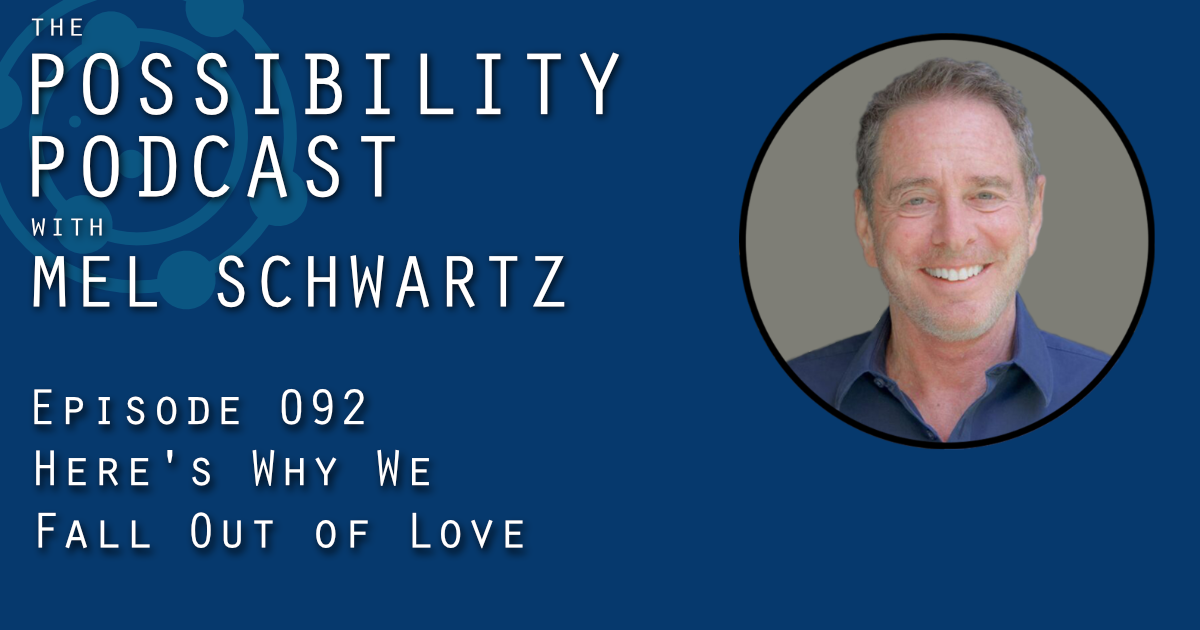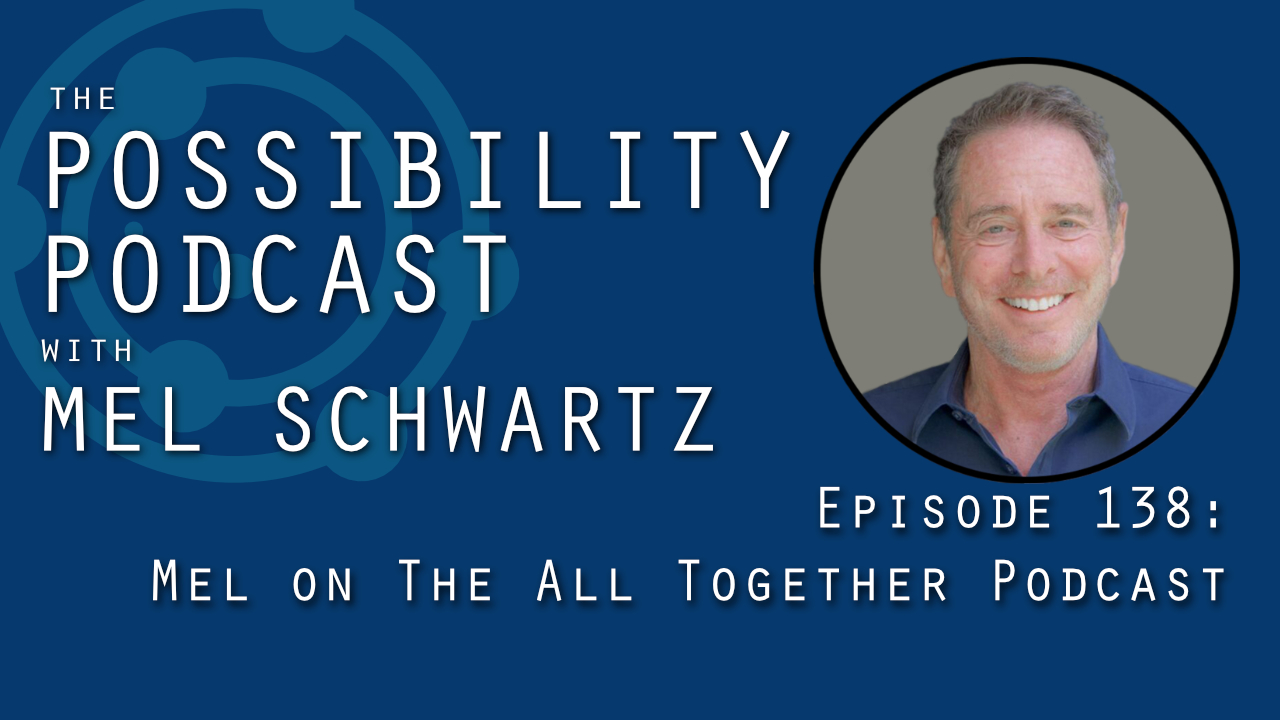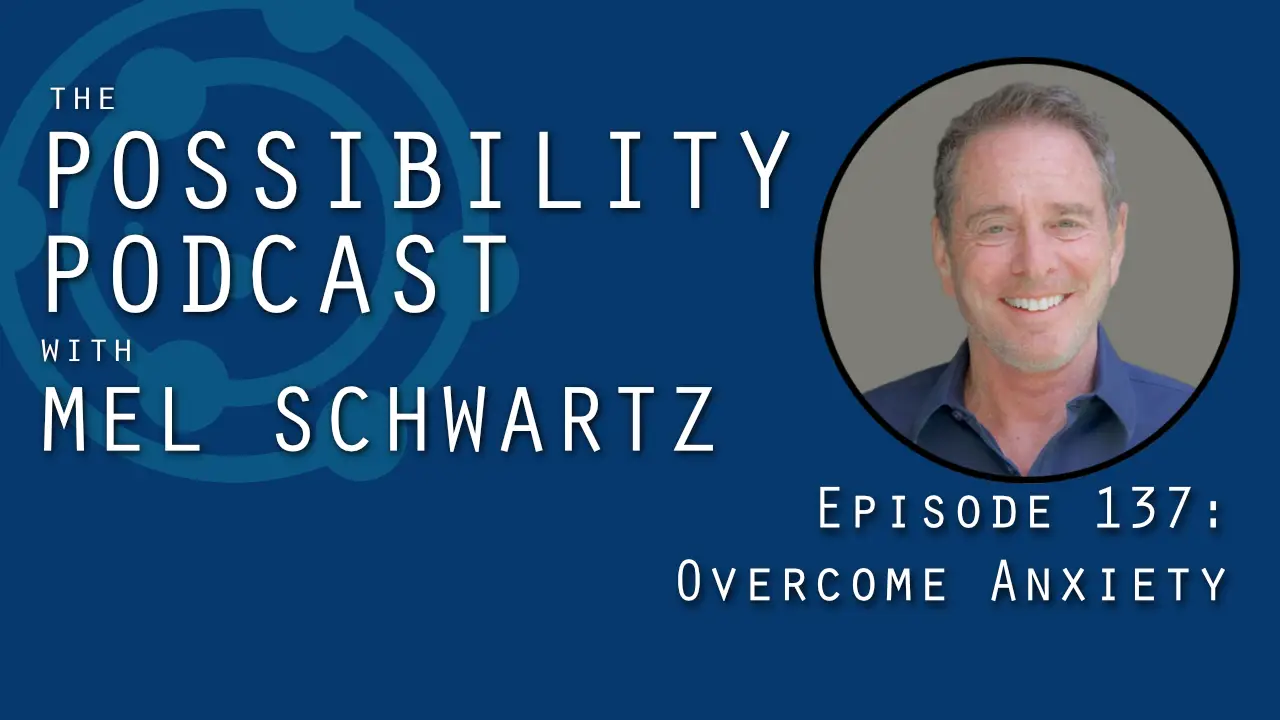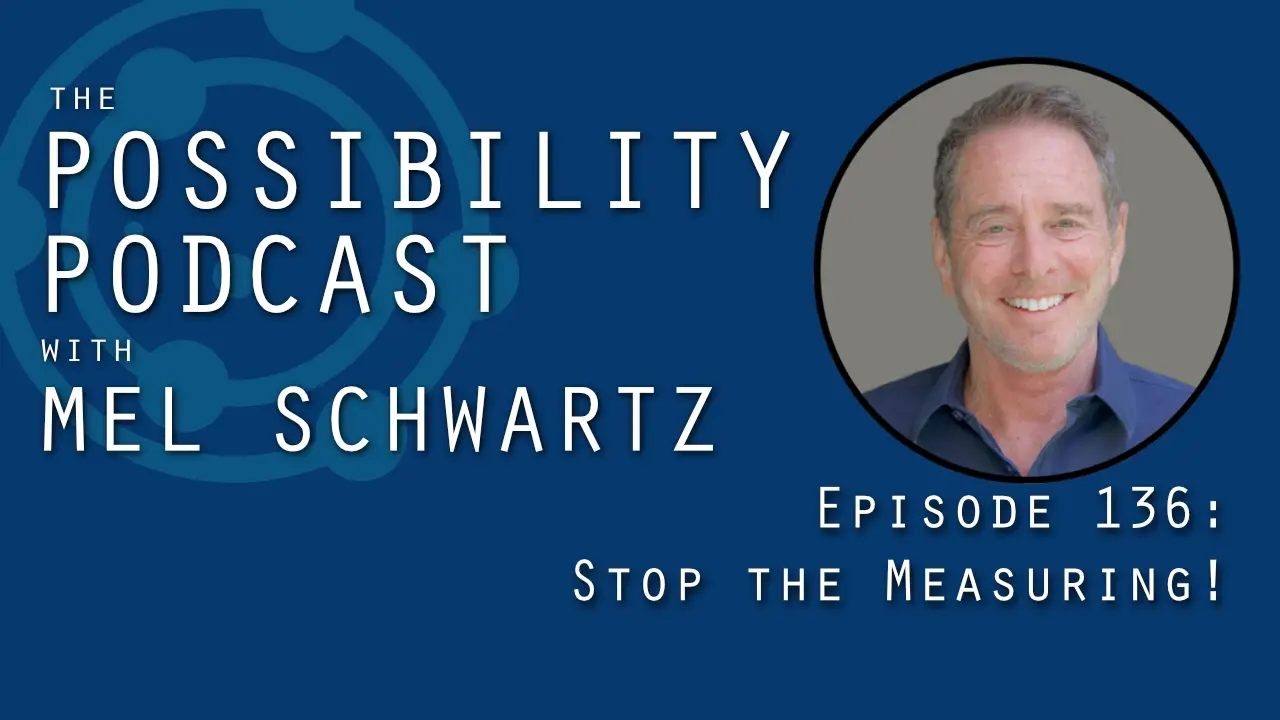Podcast: Play in new window | Download
In this 92nd episode of The Possibility Podcast with Mel Schwartz, we look at the phenomenal feeling of new love, and explore not just why the transcendent flow state of being in love seems to fade over time, but how to restore and sustain that feeling in a mature loving relationship.
Are you concerned the timeless excitement of a new loving relationship won’t last? Are you looking to rejuvenate that feeling with your partner? Listen to this episode, and I’ll help you.
As always, I welcome your comments!
Subscribe to The Possibility Podcast with Mel Schwartz
Don’t miss a single Possibility Podcast with Mel Schwartz! Subscribe for free in iTunes / Apple Podcasts, YouTube, Spotify, RadioPublic, Spreaker, or wherever you listen to podcasts. Or, simply copy / paste the RSS link directly into the podcast app of your choice!
Please Rate and Review
If you enjoy The Possibility Podcast with Mel Schwartz, please take a moment to rate and review the show in iTunes / Apple Podcasts or Podchaser. It only takes a few minutes, and adding your review is as easy as clicking this link.
Your rating and review helps raise the visibility of The Possibility Podcast with Mel Schwartz, especially on iTunes / Apple Podcasts, which is one of the biggest podcasting platforms today. More visibility for the show means more listeners… and that growth means the show reaches — and helps — more people like you.
Thank you!
Talk With Mel!
Help others when Mel helps you: Contact Mel and find out how you can be a caller on the show and ask Mel a question. He’ll put the Possibility Principle to work for you, and your conversation will be recorded for use in a future episode of the podcast so other listeners can benefit.
Transcript of The Possibility Podcast with Mel Schwartz #092
Hello, everybody, and welcome to The Possibility Podcast. I’m your host, Mel Schwartz. I practice psychotherapy, marriage counseling, and I am the author of the book, The Possibility Principle, the companion to this podcast. I hope to be your thought provocateur, and I’ll be introducing you to new ways of thinking and a new game plan for life.
Hello everyone. We’re going to take a look today at the phenomenon of falling in love and why sadly and regrettably in the majority of cases over a period of time, we fall out of love. We’re going to look at this phenomenon and understand that it’s commonplace, but that doesn’t make it natural. And what we have to learn to break this habit and this tendency, which is just so soul-defeating.
Can you remember what it was like last time you fell in love? If you fell in love with the person that you’re partnered with right now, what that memory was like? You remember the experience of spending hours and hours together, maybe just mesmerized sitting, talking, having fun, perhaps passion. And at the end of that time together, did you look at your watch or nowadays your phone and think in disbelief? How could that have been four hours? It felt like 20 minutes.
Why did the passage of time feel so different?
I think it was because we were present in every thought, in every feeling and experience. We’re in a state of discovery. And so time becomes relative. You had little history together, so you weren’t thinking of the past and you didn’t know each other well enough yet to project into the future. So you were attentive, you were truly present, or you were in flow.
You may have noticed things about each other that you wouldn’t typically look at and notice it was that sense of awareness. You might recall some particulars, where you were, the clothes you were wearing, the setting, the fragrance in the air. These details may linger in our memories. These pictures remain present because we were present. We were not sleepwalking through the experience. So time seemed to fly because we were consciously present in the moment. And as a result, that moment was likely full of connection, enchantment, maybe awe.
That’s what love feels like. And that’s what precisely is required to make us feel alive. To experience love or being in love, you must be present in the moment. Wonder is a vital ingredient in this formulation of love energy or deep, emotionally intimate relationships. Wonder means not having all the answers, which over a period of time become the death knell of a relationship. We’ll get to that in a moment.
But again, wonder, enchantment, and awe are only possible when we’re present and only when there is a harmony between our mind and our hearts. We are feeling as much as we are thinking. Our irrational mind is not yet controlling the experience, and our heart is actually fully participating. Our being, our soul, is completely present. This is your relationship at the best, tuned in, actually a state of attunement. This is what we refer to as falling in love.
But sadly, this state of bliss fades, almost with few exceptions. Let’s look at why.
Let’s think about what that experience together looks like some years or many years later. The experience of harmony and being as one dissipates. It becomes a competitive contest of individualism. You may say to your partner, you did say that, and in their disbelief, they fired back. What do you mean? I never said anything like that. And after a few exchanges like that, you have to wonder, who are we talking to? Obviously not one another. We had different experiences. In effect, no one is present.
Why is that?
The reason is we’re no longer listening. We’re no longer present. We’re playing reruns in our minds. What are the reruns about? They’re about the fall from grace, the fall from harmony into disharmony and conflict. Our mind becomes full and just jaded with bad, hurtful memories. And so we get into these arguments and exchanges and we’re busily preparing our response. We don’t even hear a word. We’re not present. We have our truth and they have theirs. And we never hear the other’s truth when we’re so preoccupied defending our own.
So instead of listening carefully, tuning in, having curiosity and trying to validate what the other person’s saying, we’re thinking about our best argument. We’re in the battle of right or wrong. Once again, what happens?
We’re no longer acting lovingly. We may say we love each other, but we’re not acting lovingly. And the relationship now starts to look like a debating club, no longer an exercise in loving intimacy. When this happens, our hearts close up. They are no longer open and they are no longer the source of the loving relationship. So this kind of exchange and conflict depletes our love energy. We begin to make ourselves absent and we become deaf to meaningful communication. And that causes boredom and a host of other problems that sabotage our relationship.
Let’s look a little further into the implications of not being present. Our memory banks become full. Regrettably, they’re not full of meaning and love and harmony and bliss. They become full of more recent negative conflicted interactions. And you know, these are not so much about the objective event itself, only our current perception. So as time goes by, there’s a tendency to shape our memory to now fit our current belief system about our partner, our spouse, and ourselves. And that’s why two people end up with very different memories of past interactions.
That’s the source of the argument, the disbelief of you said that and you were so angry. No, I wasn’t. I was listening to you and I was I was completely caring. How do we have two different realities? We have two different memories. Sometimes we’ve come to know each other so well, but in some ways, not deeply enough and not honestly enough. There’s a tendency at that point for us to think we know how the other person thinks and acts and who they are. And so we edit our past memories to fit our current experience. We then projected into the future, our current perception of the recent past actually becomes our future experience, having now created the future out of a new belief system.
We were locked into a box and we have trouble finding our way out. When we perceive things out of our habitual response, we limit the future to the same behaviors and we’re not present in the moment.
Let’s look at what happens when we’re not in the present. For one thing, there’s no new learning. Something new that your partner has to offer, you may deflect and you kind of relegate it into that box of the known that your memory bank has placed the other person in. As you stop learning, if we do that, the vitality of our relationship withers. The source of a vibrant relationship is to be able to learn new things about each other. Having curiosity and wonder allows us to do that. But when we don’t, we grow bored and we lose interest in the other person. You assume you automatically know everything there is to know about each other. And then the relationship withers, it stagnates. You may look for reasons to avoid each other or occupy yourself with other things or other people or you may get frustrated and engaged in conflict. Under these circumstances, there’s just a greater likelihood that you’re going to act out on your frustrations.
But as you know, which I have spoken about at length and you’ve read in my book, The Possibility Principle, reality is comprised of a state of infinite possibility. We have to open to the spontaneity of the moment, being fully alive, free from the constraints of old reruns to open to those limitless possibilities. Remember when you first met and fell in love, there were no memory banks operating yet. You had to listen attentively. In fact, you wanted to listen. It was fascinating.
So what happened? The original object of your desire and love is still more or less the same person. What changed? We both probably went to sleep. We hurt each other. We disappointed each other. We started to close up and protect against being vulnerable. And the script plays on until we trigger each other. We stop becoming attentive and present.
Now what’s required is to awaken and once more come alive in the moment. When relationship is based upon predictive assumptions like a mathematical equation, and we assume we know the outcome in advance, there’s just no chance or a little chance that things will turn out differently. We’ve written it into the script and the future is already played out. That being the case, there’s no need to be present. It’s no wonder we fall out of love so easily. It’s not that love and passion have to die. It’s just that we’re living and behaving in a way that will cause that to happen.
In my first book, The Art of Intimacy, I had a section called the spider’s web. And here’s how I described it. When we’re sleepwalking through life inattentive, not really conscious, we think of our lives as a straight line from past to present to future. So the past becomes the present and there’s no change of perspective. It also becomes the future.
A way to break out of this way of seeing yourself and your partner is to imagine yourself in the middle of a spider’s web. In the center of a spider’s web, there’s no past. You’re just at the starting point in the center, in the moment you’re in. All around you, in every direction, are an infinite number of pathways and they’re all open to you. You’re free to choose one and then another. You’re not constrained by your mental and emotional baggage of your past, your wounds, your hurts, set them aside.
You see, if there is no past, all that exists is the moment you’re in. Using this visualization of the spider’s web, there is no past. You freed yourself from that illusion. All paths are open. Each choice you make creates a new timeline. And as you choose in no direction, you’re always free to choose another and navigate differently. The choices are infinite.
The same can be true of your relationship experience. How do we do that? We notice the reaction. We notice our old thought and our old feeling and we imagine saying shhh to the reaction. Don’t become your reaction. Picture yourself in that limitless, infinite possibility of choices. Imagine yourself if you react, you are into present. That doesn’t mean you can’t respond. Responding means you don’t become your reaction, but you’re free to communicate. You’re free to communicate what you’re feeling and ask the other, do you care how I feel?
And instead of judging one another’s feelings, you must try to understand the feeling. Feelings aren’t right or wrong. You can’t say I love you if you don’t care how you feel. The key here is to tune into the feeling, get out of the script of the past, become curious, have wonder, have curiosity, stop judging, seize the moment and become present in the moment. To do this, you quiet your voice, you quiet your old thoughts. If you need to familiarize yourself with that process, check out chapter three in my book, The Possibility Principle or listen into earlier podcast episodes of freeing yourself from old thought. You can recreate your experience of yourself and your partner in any moment you choose. Seize that moment and become present.
Well, that’s it for now. I look forward to speaking with you again soon. Be well, be safe and be present.
I hope you enjoyed this episode of The Possibility Podcast. I welcome your feedback on this and any episode. Please send me an email at mel at melschwarz.com or leave a comment in the show notes for this episode at melschwarz.com. If you like what you’re hearing, please take a moment to rate and review the show at Apple Podcasts, Spotify or wherever you get your podcasts. Your reviews really help boost the visibility for the show and it’s a great way for you to show your support. Finally, please make sure to subscribe to The Possibility Podcast wherever you listen to podcasts and that way you’ll never miss an episode. Thanks again and please remember to always welcome uncertainty into your life and embrace new possibilities.





I love your intelligent insight, Mel! I’ve been saying things similar to this for many years. It’s refreshing to hear a professional declare as much. Thank you.
…liked & shared!
Thanks so much Debi!